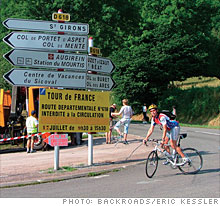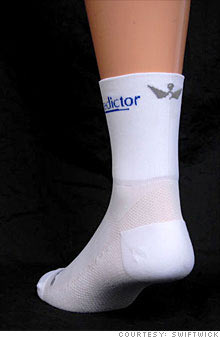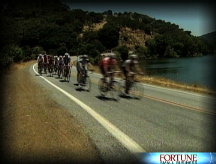Tour de France marketing hits uphill stage
During Lance's glory years, cycling's premier event was a publicity bonanza for businesses. Now, sponsors say it's a trickier sell - but the Tour can still help regional companies capture a national audience.
 |
| Backroads ran 22 Tour de France trips in 2004; last year, it only had enough demand to fill one. |
 |
| Swiftwick's socks graced Tour star Robbie McEwen's feet last year, a nice publicity boost for the fledgling company. |
(Fortune Small Business) -- While Lance Armstrong chased his record-setting Tour de France winning streak, a number of American businesses rode victoriously along. For Trek Travel in Madison, Wisc., the mid-'00s were boom times: 500 travelers each year booked $5,000 trips to see Lance in action, giving the two-year-old company $2.5 million in revenue a year from the Tour de France alone.
"We would finish the Tour, and even before the itineraries came out for next year, we would have a waiting list," recalls Tania Worgull, Trek Travel's president. Then a subsidiary of bike manufacturer Trek Bicycling Corp., a sponsor of seven-time-champion Armstrong's winning team, Trek Travel booked 25% of its annual sales from the 23-day Tour.
Then Armstrong retired in 2005, and U.S. travel companies saw a sharp decline in sales for Tour de France trips. Around that same time, doping controversies engulfed prominent riders Tyler Hamilton, Floyd Landis, Jan Ullrich and Ivan Basso, further disenchanting some fans of the sport.
Backroads, an adventure travel company in Berkeley, Calif., filled 22 trips with more than 4,000 travelers in 2004, its best Tour de France year. Three years later, the travel company could only muster enough travelers to run one of its seven scheduled Tour de France trips.
"There's a possibility the popularity could have extended after Lance Armstrong retired," says Rich Snodsmith, sales manager. "It's hard to get super-excited about what's happening in the sport right now because of the doping thing. But it's happening everywhere. It's happening in baseball."
Because the Tour de France trips were a small segment of the company's many travel offerings, Backroads fared well and continued to grow sales by focusing on its other products, Snodsmith says. Some other mom-and-pop-type operations folded.
"Basing your business around the Tour is not a business model," Snodsmith says. "We were really looking to capitalize on this perfect storm of Lance Armstrong going for the five wins, and then 2003 was the 100th anniversary of the Tour. But it was pretty clear, the interest was waning once Armstrong was getting ready to retire."
Similarly, Trek Travel saw a decrease in its Tour de France bookings around the time the business split from its parent company two years ago. Trek Travel booked 150 people for Tour de France-related trips in 2007, a mere fraction of its previous peak.
The company, which has 50 employees and averages $4.5 million to $6 million in annual revenue, is still growing, Worgull says, by marketing new trips to former Tour de France travelers, and by offering less strenuous bike tours for beginning cyclists. Popular destinations include major cycling events the Giro d'Italia, the tour of California and the Tour de Georgia. Trek Travel is also launching trips to Croatia and Australia in 2009.
"The Tour de France was such a popular destination, and it increased our exposure to cyclists that like to travel," Worgull says. "Now that Lance isn't riding and it's not as popular, you have to look at how you're bringing travelers back. You have to get more creative."
Fancy footwork
Former cyclist and entrepreneur Sharp Emmons, 37, used Tour publicity to get his new company off to a racing start. Based in Brentwood, Tenn., Swiftwick International went into business last year selling athletic socks made of merino wool and olefin - a fiber that wicks away moisture and dries quickly. Emmons says the socks help with circulation, stay drier in sweaty situations, and don't wad up at a cyclist's ankle, even after an all-day race.
Emmons first promoted the sock by getting two American teams, Jittery Joe's Pro Cycling based in Atlanta and the Luna Pro women's team in Berkeley, to wear custom versions in competition. Then, Robbie McEwen, a triple-winner of the Tour de France's sprinter competition, opted to wear them in several race stages in France last year.
"It got the product in front of cyclists," Emmons says. "It's one of those industries where when you have the key influencers promoting your product, it begins to take off."
Now, Emmons' company has bragging rights. Its Tour de France premiere garnered press coverage back home in Tennessee, and Emmonss heavily promotes the coup that his socks were worn by professional cyclists in the big Tour. Plus, the exposure in Europe led some Tour de France cyclists to take the product back to their home countries: After last year's Tour, Swiftwick landed orders from the Australian National Team.
Emmonss brought on business partners and other employees, and what was a one-man operation just a few months before turned into a small business.
The company, which is still investing heavily in distribution channels and building inventory, is not yet turning a profit, said co-owner Mark Cleveland. Still, he's pleased with the progress Swiftwick has made in less than two years. Its socks are being sold in 10 states in 45 stores - including Mellow Johnny's, Armstrong's Austin-based flagship cycling store. The store's 150 pairs of custom Swiftwicks, featuring the Mellow Johnny's logo, sold out in their first two weeks on the shelves.
This year, Emmons is sitting the Tour out. He wants to move beyond the cycling market and bring the Swiftwick brand to golf shops, athletic apparel stores, uniform catalogs and upscale boutiques.
As past marketers leave the Tour, new ones ride in. Even though the Tour de France is one of the world's most-watched sporting events, U.S. cycling teams had trouble securing lead sponsors this year after longtime backers Discovery Channel and T-Mobile bowed out at the end of last season. It took those two teams, which now ride as Garmin-Chipotle and Team Columbia, until June to land their new title partners.
Look below the marquee names and you'll find some unexpected sponsors - such as Pittsburgh furniture retailer Roomful Express. Why is a regional U.S. chain, in a business that has little to do with cycling, marketing itself in France?
Paul Sanford, corporate operations officer for the chain, says the company's original intent was to buy itself a local presence in regional races such as the Tour de Toona in Altoona, Penn., and the Tour of Pennsylvania. Team Garmin-Chipotle competed in both those races prior to securing Garmin (GRMN) and Chipotle (CMG) as title sponsors, and Roomful Express and other small businesses were able to become minor sponsors for $250,000 each - a relatively low cost compared to the nearly $9 million sponsorships that once funded the U.S. Postal team.
Sanford says the company, which had $85 million in sales last year, expects to see its investment returned within the year. At the local events, Roomful Express ran a coupon campaign and ads offering a four-day Tour de France travel package to one local winner. Sanford says the company hasn't tallied its Web and foot traffic yet, but he suspects it's increased significantly.
"A presence with the team and having our name blazoned in Pennsylvania was helpful to us - it gave us more visibility in the community," Sanford says. "As for the Tour de France, we've leveraged that in our marketing."
Roomful Express got an unexpected added value for its sponsorshop when Mike Friedman, a Garmin-Chipotle rider and Pittsburgh native, was named to the U.S. Olympic cycling team. The small chain, which cannot afford national television spots during the Olympic Games, hopes to leverage its connection to Friedman, bringing him to the store for promotional appearances.
If that exposure proves as successful for Roomful Express as it was for Swiftwick, it could lead to new directions and new business strategies.
"The heartbeat of our company was discovered at the Tour de France," says Swiftwick's Cleveland. "While we may not have had the video news coverage, we did get in on the peleton chat among professional riders. It's a grassroots draw-up from that exposure. We owe a tremendous amount of our success to a handful of guys on bikes." ![]()
King of the mountain bike: Mike Sinyard built Specialized into a top bike brand by listening to what serious cyclists wanted.
Destination bike tours go wireless
Bamboo bikes give athletes a lift
Cyber Cyclist
-
The Cheesecake Factory created smaller portions to survive the downturn. Play
-
A breeder of award-winning marijuana seeds is following the money and heading to the U.S. More
-
Most small businesses die within five years, but Amish businesses have a survival rate north of 90%. More
-
The 10 most popular franchise brands over the past decade -- and their failure rates. More
-
These firms are the last left in America making iconic products now in their twilight. More










